

Learning Theory - What are the established learning theories? Learning Theory - What are the established learning theories? Vygotsky (1978). Mind in society: The development of higher psychological processes. Vygotsky, L.
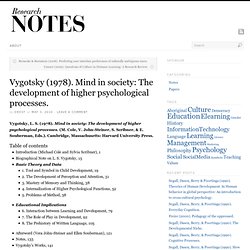
S. (1978). Mind in society: The development of higher psychological processes. (M. Cole, V. John-Steiner, S. Table of contents Introduction (Michael Cole and Sylvia Scribner), 1Biographical Note on L. Chapter 1 “Tool and Symbol in Child Development” (pp 19-30) [Discussion about how language development and practical intelligence were seen as developing separately, for example, Piaget identified egocentric speech as though there was no organizing function of the language activity (p 23-24).] [Apes and people with aphasia ...] “Guillaume and Meyerson offer a different conclusion regarding the role of speech in the inception of uniquely human forms of behavior. “Our analysis accords symbolic activity a specific organizing function that penetrates the process of tool use and produces fundamentally new forms of behavior.”
[V. describes how language is used to form complex processes, different from direct manipulation as evidenced in apes (p 26)] [Reference to social speech... ] Cognitivism. Summary: The cognitivist paradigm essentially argues that the “black box” of the mind should be opened and understood.
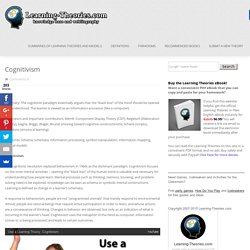
The learner is viewed as an information processor (like a computer). Originators and important contributors: Merrill -Component Display Theory (CDT), Reigeluth (Elaboration Theory), Gagne, Briggs, Wager, Bruner (moving toward cognitive constructivism), Schank (scripts), Scandura (structural learning) Keywords: Schema, schemata, information processing, symbol manipulation, information mapping, mental models Cognitivism The cognitivist revolution replaced behaviorism in 1960s as the dominant paradigm. A response to behaviorism, people are not “programmed animals” that merely respond to environmental stimuli; people are rational beings that require active participation in order to learn, and whose actions are a consequence of thinking. Constructivism. Summary: Constructivism as a paradigm or worldview posits that learning is an active, constructive process.
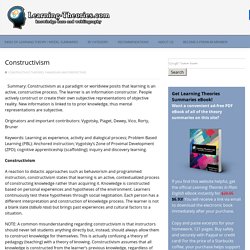
The learner is an information constructor. People actively construct or create their own subjective representations of objective reality. New information is linked to to prior knowledge, thus mental representations are subjective. Originators and important contributors: Vygotsky, Piaget, Dewey, Vico, Rorty, Bruner Keywords: Learning as experience, activity and dialogical process; Problem Based Learning (PBL); Anchored instruction; Vygotsky’s Zone of Proximal Development (ZPD); cognitive apprenticeship (scaffolding); inquiry and discovery learning. Constructivism A reaction to didactic approaches such as behaviorism and programmed instruction, constructivism states that learning is an active, contextualized process of constructing knowledge rather than acquiring it. Vygotsky’s social development theory is one of the foundations for constructivism.
Stage Theory of Cognitive Development (Piaget. Summary: Piaget’s Stage Theory of Cognitive Development is a description of cognitive development as four distinct stages in children: sensorimotor, preoperational, concrete, and formal.
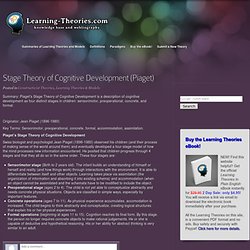
Originator: Jean Piaget (1896-1980) Key Terms: Sensorimotor, preoperational, concrete, formal, accommodation, assimilation. Piaget’s Stage Theory of Cognitive Development Swiss biologist and psychologist Jean Piaget (1896-1980) observed his children (and their process of making sense of the world around them) and eventually developed a four-stage model of how the mind processes new information encountered. He posited that children progress through 4 stages and that they all do so in the same order.
Sensorimotor stage (Birth to 2 years old). Social Development Theory (Vygotsky. Summary: Social Development Theory argues that social interaction precedes development; consciousness and cognition are the end product of socialization and social behavior.
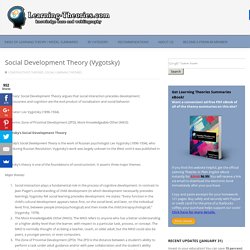
Originator: Lev Vygotsky (1896-1934). Key terms: Zone of Proximal Development (ZPD), More Knowledgeable Other (MKO) Vygotsky’s Social Development Theory Vygotsky’s Social Development Theory is the work of Russian psychologist Lev Vygotsky (1896-1934), who lived during Russian Revolution. Vygotsky’s work was largely unkown to the West until it was published in 1962. Vygotsky’s theory is one of the foundations of constructivism. Major themes: Social interaction plays a fundamental role in the process of cognitive development.
Vygotsky focused on the connections between people and the sociocultural context in which they act and interact in shared experiences (Crawford, 1996).